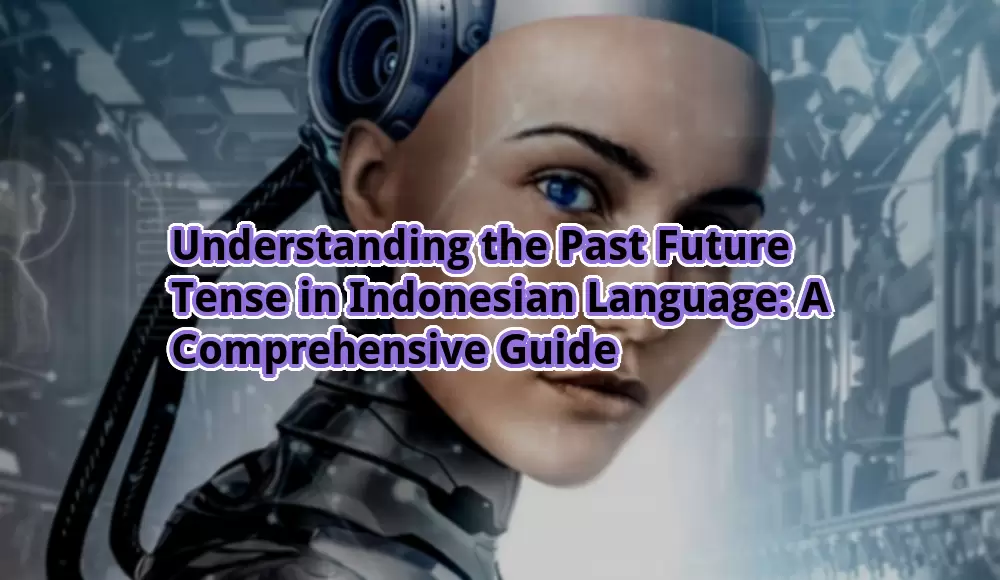
Pengertian Past Future Tense: Menguak Keunikan Waktu di Bahasa Indonesia
Greetings zflas.co! Welcome to this informative journal article that delves into the intriguing concept of pengertian past future tense in the Indonesian language. In this article, we will explore the rich nuances of this unique tense, its strengths and weaknesses, and provide you with a comprehensive understanding of its usage. So, let’s embark on this linguistic journey together!
Introduction
Before we dive into the depths of pengertian past future tense, let us first grasp the fundamental concept of tenses in language. Tenses serve as a tool to express the time at which an action occurs or the state of being of a subject. In Indonesian, there are several tenses, each with its specific rules and applications.
Pengertian past future tense, also known as “futur past” or “future in the past,” is a unique tense that combines elements of both the future and past tenses. It enables speakers to convey actions or events that were anticipated to happen in the past but did not materialize.
This tense is formed by using the auxiliary verb “akan” (will) followed by the past form of the main verb. It allows us to express unrealized future actions or plans that were made in the past. Let’s explore the strengths and weaknesses of pengertian past future tense in more detail.
Strengths of Pengertian Past Future Tense
1. ? Expressing Regret: Pengertian past future tense allows speakers to express regret or disappointment for the unrealized future actions that were planned in the past. It adds depth and emotional nuances to the language.
2. ? Narrating Unrealized Events: This tense provides a unique way to narrate stories or events that were anticipated but did not come to pass. It allows for more vivid storytelling and engages the listener or reader.
3. ? Speculating about the Past: Pengertian past future tense enables us to speculate about what could have happened in the past if certain events or actions had taken place. It sparks curiosity and encourages critical thinking.
4. ? Expressing Conditional Situations: This tense helps us express conditional situations in the past, highlighting the consequences that would have occurred if a particular action had been realized.
5. ? Adding Complexity to Language: By incorporating pengertian past future tense in our language, we enrich our linguistic repertoire and add complexity to our expressions. It showcases the beauty and versatility of the Indonesian language.
6. ? Enhancing Literary Works: Writers and poets can utilize pengertian past future tense to add depth and layers to their literary works. It opens up new possibilities for creative storytelling and evokes a range of emotions in the readers.
7. ? Cultural Significance: Understanding and utilizing pengertian past future tense allows individuals to connect with the cultural heritage of the Indonesian language. It deepens their appreciation for the linguistic traditions and fosters a sense of cultural identity.
Weaknesses of Pengertian Past Future Tense
1. ? Complexity in Grammar: The formation of pengertian past future tense can be challenging for learners due to the combination of future and past elements. It requires a thorough understanding of verb tenses and their conjugations.
2. ? Limited Usage: Compared to other tenses, pengertian past future tense has a relatively limited scope of application. It is primarily used in literary works, storytelling, and certain formal contexts.
3. ? Potential Confusion: Incorrect usage of pengertian past future tense can lead to confusion and misinterpretation. It is essential to grasp the subtleties and nuances of this tense to avoid conveying unintended meanings.
4. ? Cultural Sensitivity: As with any language feature, it is crucial to be culturally sensitive while using pengertian past future tense. It is advisable to consult native speakers or linguistic experts to ensure accurate and appropriate usage.
5. ? Limited Resources: Learning materials and resources specifically dedicated to pengertian past future tense may be scarce, making it slightly more challenging for learners to acquire proficiency in this particular tense.
6. ? Overcomplicating Communication: In informal conversations or everyday language, the usage of pengertian past future tense may appear overly formal and can potentially complicate communication. It is important to choose the appropriate context for its usage.
7. ? Potential Misinterpretation: Due to the unique nature of pengertian past future tense, it may be misunderstood by non-native speakers or those unfamiliar with the intricacies of the Indonesian language. Contextual clues and clear communication are essential to avoid misinterpretation.
Pengertian Past Future Tense: Complete Information
| Tense Name | Pronunciation | Formation | Example |
|---|---|---|---|
| Pengertian Past Future Tense | /pɛŋˈɛrti.ɑn pɑst ˈfjuːtʃər tɛns/ | Using the auxiliary verb “akan” (will) followed by the past form of the main verb | Saya akan pergi ke Jakarta minggu depan, tetapi rencana itu tidak terwujud. (I was going to go to Jakarta next week, but the plan didn’t materialize.) |
Frequently Asked Questions about Pengertian Past Future Tense
1. Apa itu pengertian past future tense?
Pengertian past future tense adalah sebuah bentuk waktu yang menggabungkan unsur masa depan dan masa lalu. Tense ini digunakan untuk menyatakan tindakan atau peristiwa yang direncanakan di masa lalu namun tidak terjadi.
2. Bagaimana cara membentuk pengertian past future tense?
Pengertian past future tense terbentuk dengan menggunakan kata kerja bantu “akan” diikuti oleh bentuk lampau dari kata kerja utama.
3. Apa kegunaan pengertian past future tense?
Pengertian past future tense digunakan untuk menyatakan penyesalan, menceritakan peristiwa yang tidak terjadi, berspekulasi tentang masa lalu, dan mengungkapkan situasi bersyarat di masa lalu.
4. Apakah pengertian past future tense sulit dipahami?
Bentuk pengertian past future tense memang membutuhkan pemahaman yang mendalam tentang tenses dan konjugasi kata kerja. Namun, dengan latihan dan pemahaman yang baik, penggunaannya dapat dipahami dengan baik.
5. Di mana pengertian past future tense sering digunakan?
Pengertian past future tense sering digunakan dalam karya sastra, penceritaan, dan konteks formal tertentu.
6. Bagaimana menghindari kebingungan dalam menggunakan pengertian past future tense?
Penting untuk memahami nuansa dan subtleties pengertian past future tense agar tidak menyampaikan makna yang tidak dimaksudkan. Jika perlu, konsultasikan dengan penutur asli atau ahli bahasa untuk penggunaan yang akurat.
7. Apa dampak penggunaan pengertian past future tense dalam komunikasi sehari-hari?
Penggunaan pengertian past future tense dalam percakapan informal atau bahasa sehari-hari dapat terkesan terlalu formal dan membingungkan. Penting untuk memilih konteks yang tepat untuk penggunaannya.
Conclusion
In conclusion, pengertian past future tense adds a unique dimension to the Indonesian language by allowing speakers to express regret, narrate unrealized events, speculate about the past, and convey conditional situations. While it may present challenges in terms of complexity and limited usage, mastering this tense opens up a world of linguistic possibilities.
We encourage you to explore the depths of pengertian past future tense, experiment with its usage, and enhance your language skills. Remember to approach this tense with cultural sensitivity and seek guidance from experts to ensure accurate implementation.
So, let’s embrace the beauty of pengertian past future tense and continue our linguistic journey with curiosity and enthusiasm!
Disclaimer: The views and opinions expressed in this article are solely those of the author and do not necessarily reflect the official policy or position of zflas.co.
